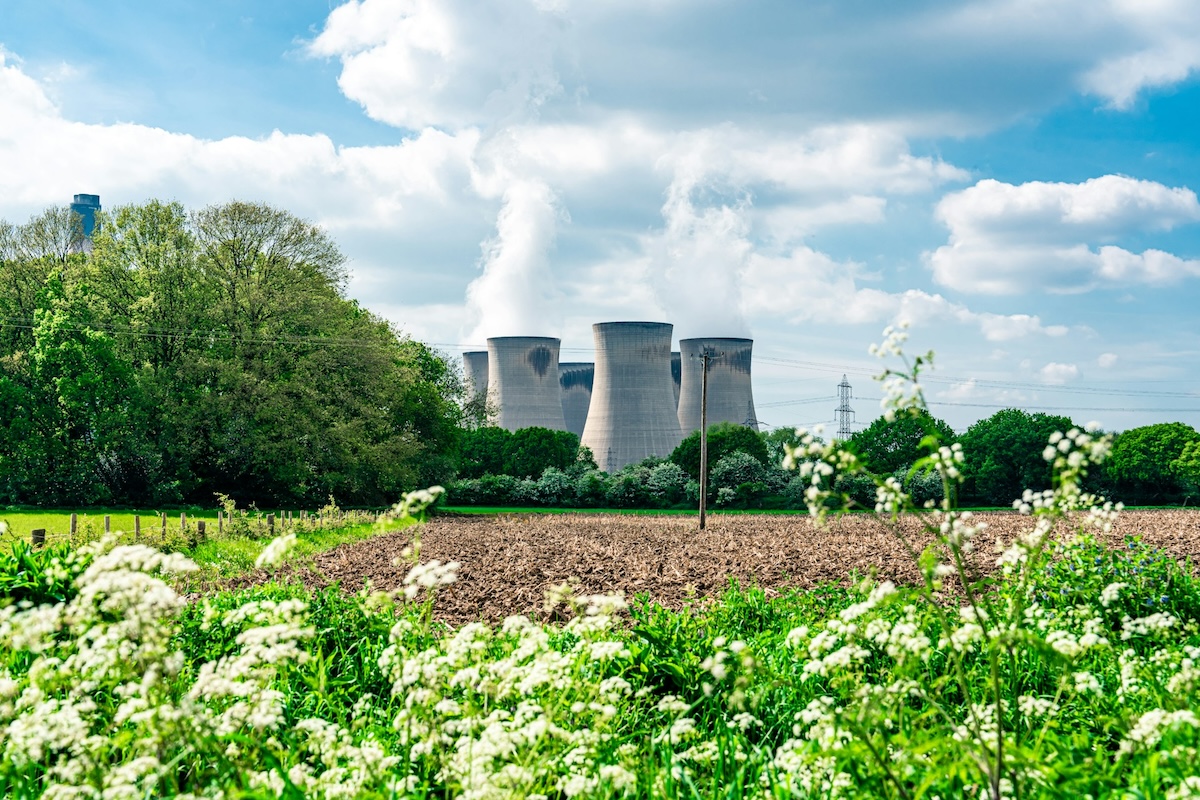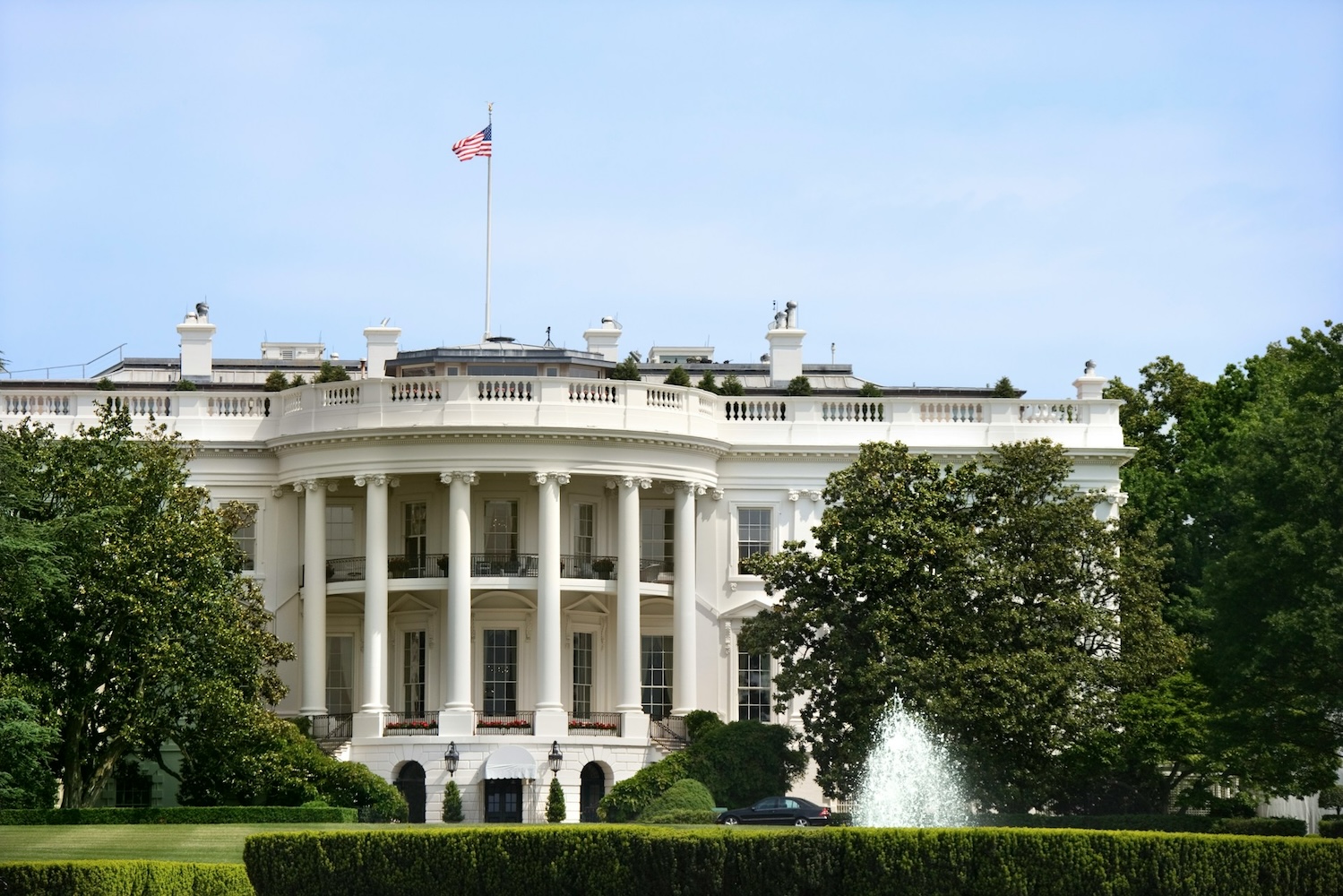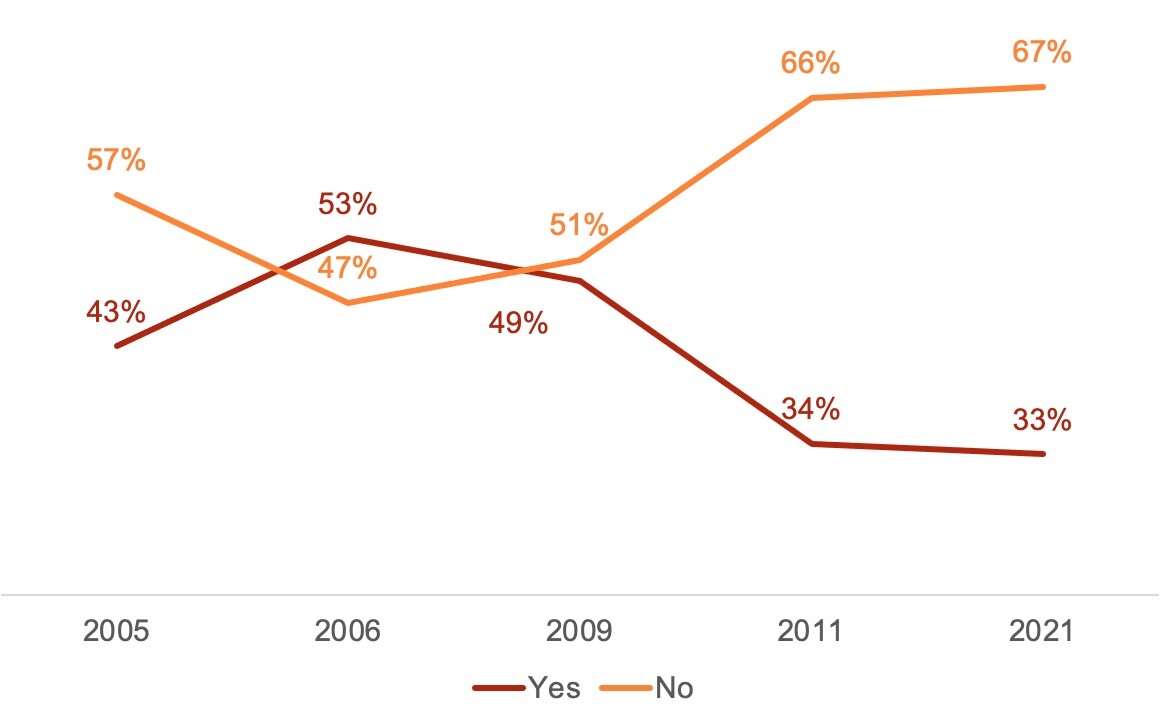
Public opinion on nuclear
Read more: Public opinion on nuclearThere has always been a love/hate relationship between nuclear and the general public as we can see in the general public opinion.
I read a few years ago that it’s partly related to the fact that the very first use of nuclear energy was during WWII and has remained in the collective memory.
Although there was a nuclear renaissance in the early 2000s with large nuclear programmes in many countries, it all came to a halt in 2011 with the Fukushima Daiichi accident. All this led to countries deciding to phase out nuclear energy (e.g. Germany) or reducing their share of nuclear energy through political decisions (e.g. France) [1].
However, that was 10 years ago and things have changed. Global warming is a pressing issue, more and more countries are planning to ban diesel/petrol cars (e.g. EU by 2035) [2] and now we are really seeing the effects of global warming (droughts, fires, floods, etc.).
In light of all this, are we really still against nuclear power?
Finding polls on the general population can be a bit tricky. For some countries, there is no debate, so no chance of getting information, as there are no licenced nuclear facilities or plans for a nuclear programme there. However, part of a market study we did at Damona was to gather some data on what people think about nuclear power. We decided to share some valuable information here.
Heavily nuclearised countries
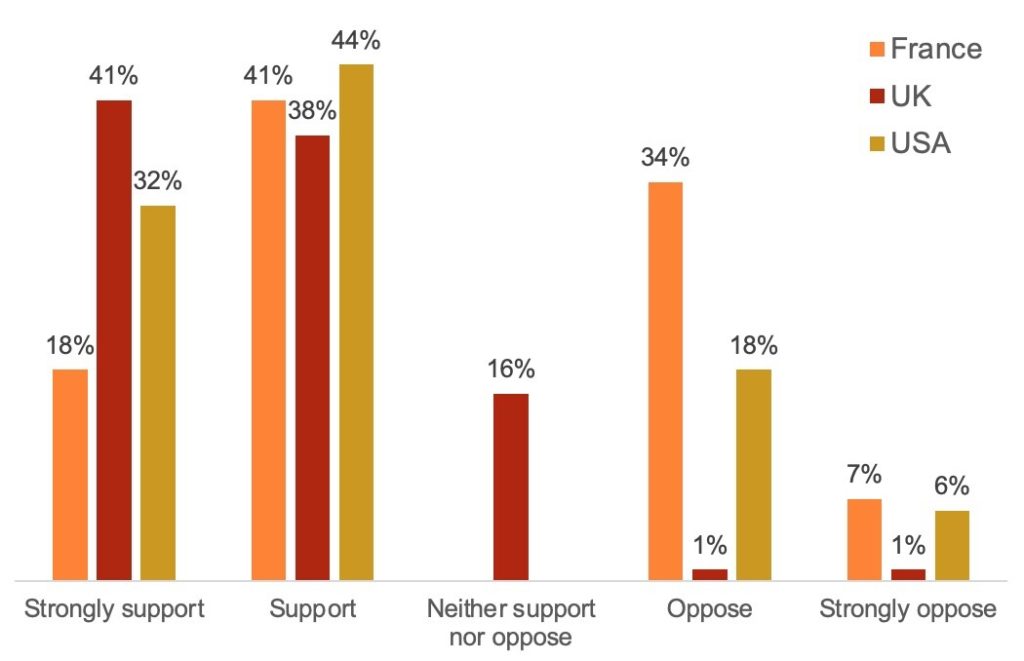
When it comes to countries that rely heavily on nuclear power, we can see that the public tends to be overwhelmingly pro-nuclear.
Interestingly, in France, one of the biggest nuclear powers, 1/3 of the population polled is against nuclear power. This is something that can be seen in a market study we published on the French market.
Has opinion changed since the Fukushima Daiichi accident?
As for the trend, the UK is quite an outlier – see graph from 2012 to 2021. Although the country has supported nuclear power for at least 10 years, the number of supporters jumped between 2020 and 2021.
What led to this drastic change? Actions by the industry to heavily promote nuclear power (e.g. the NIA initiatives) ? The inclusion of nuclear energy in the Hydrogen Strategy, as adopted in 2020 ? The fear of blackouts as seen in countries like the USA ? A different pattern ? Who knows.
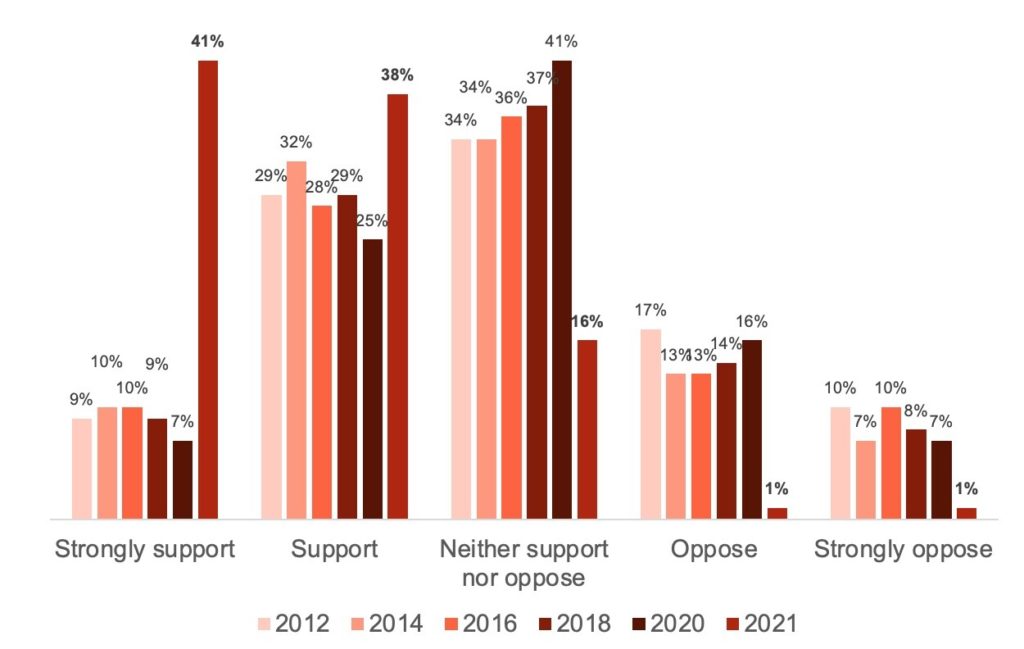
Another interesting country is Sweden. This country relies heavily on nuclear power (40% of electricity generation) and has shut down 3 reactors in the last 8 years. Despite this political decision, 78% of Swedes are strong supporters of nuclear power and 43% of them are open to building new nuclear capacity. Additionally, 35% want existing plants to operate for their entire lifetime. Only 11% of respondents are against nuclear energy, which is the lowest figure in history.
Will we also see a nuclear renaissance in Sweden? Interestingly, Vattenfall, the Swedish national utility, is now a shareholder in Fermi Energia, the startup focused on deploying SMRs in Estonia …
Policies hostile to nuclear
Now let us look at the countries that are phasing out nuclear power or are particularly opposed to it.
We could not find any polls on Germany and nuclear power. No matter what, Germany is known to be against nuclear power. The Green Party was born in Germany and the anti-nuclear campaign was one of its main pillars. It seems the country overwhelmingly supports the Energiewende, ushering in the end of nuclear power in the country in 2022.
Belgium decided last year to follow Germany’s path. But the public does not seem to be going the same way as the government. Only 1/3 of Belgians seem to know that the lost nuclear capacity should be replaced by gas-fired power plants. Moreover, almost 50% of the population does not want nuclear capacity to be shut down in 2025 (compared to 27% who support an end to the nuclear programme). Two years ago, the trend was exactly the opposite.
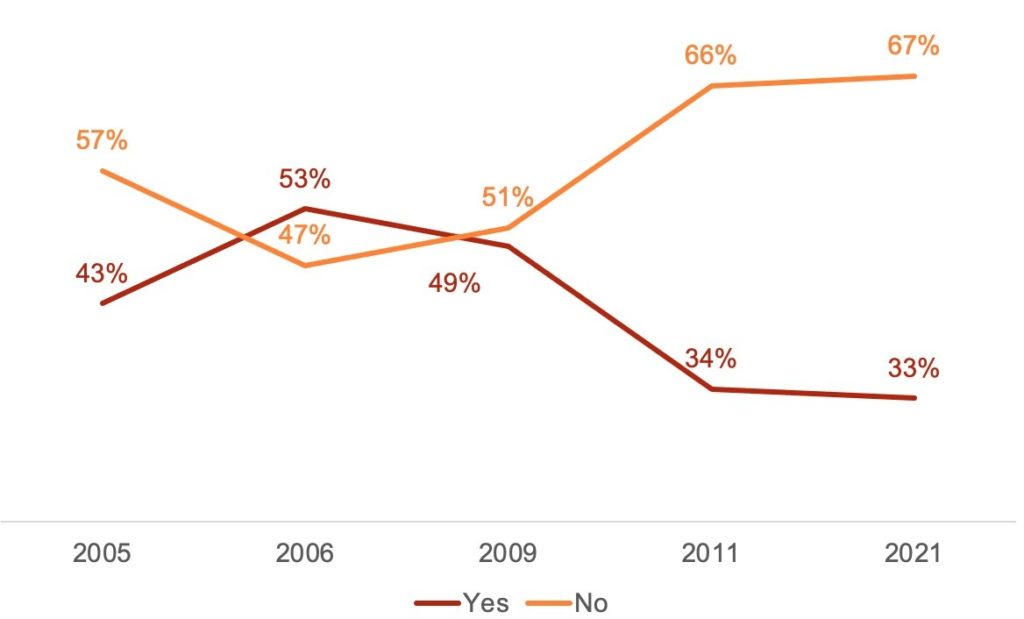
Another country worth analysing is Italy. Italy is the only G8 country without nuclear capacity. After the Chernobyl accident, a referendum in 1987 decided to stop the nuclear programme. A recent poll showed the disinterest of Italians when it comes to nuclear power, with 67% of respondents against a local nuclear programme (see chart showing Yes/No). However, there has been no debate about nuclear power in Italy in the last 10 years. Perhaps the results would be different if the public were engaged on the subject of nuclear power.
Last but not least, Spain, where our company is headquartered. A large majority of Spaniards are against nuclear power (55% against, 26% in favour). This is a general trend, although the current government (PSOE) is known to be against nuclear power and has a clear timetable for shutting down the last remaining nuclear plants. This disinterest in nuclear energy could be explained by several factors:
Lack of communication on the part of nuclear power plant operators;
Smaller nuclear industry compared to other large nuclear countries; therefore, less firepower to communicate about the benefits of nuclear power;
Simply a sunny country where the emphasis is on renewables with renewable giants like Iberdrola. But also access to water for offshore wind farms;
Political context when the nuclear industry was developed.
Maybe we will see a different trend in the next months/years when wholesale electricity prices in Spain skyrocket.
Conclusion
The opinion of the general public has moved, but not that much. All heavily nuclearized countries are more and more pro-nuclear 10 years after Fukushima. A good test will be the French presidential election in May 2022. Although President Macron has renewed his interest in nuclear power as a means to combat climate change, very few decisions have been acted upon.
Countries opposed to nuclear energy are still against it, which is not surprising. Germany is the perfect example.
However, some countries are still undecided, with public opinion diverging from government decisions (e.g. Belgium, Sweden, etc.).
Interested in more insights into the nuclear industry? Do not miss out on what we do at Damona. We specialise in business consulting for the nuclear industry and provide vital information for decision makers.
If you are interested in innovation, take a look at inTechBrew, our digital newsletter about innovation in the nuclear industry.
[1] https://www.france24.com/en/europe/20201208-macron-says-nuclear-will-remain-key-energy-source-for-france
[2] https://www.reuters.com/business/retail-consumer/eu-proposes-effective-ban-new-fossil-fuel-car-sales-2035-2021-07-14/
https://www.statista.com/statistics/426157/united-kingdom-uk-attitudes-towards-nuclear-energy/
« Retour de flamme » des Français en faveur du nucléaire
https://www.analys.se/wp-content/uploads/2019/11/20191122-analysgruppen-opinion-pressmeddelande.pdf
https://www.ans.org/news/article-2974/support-for-nuclear-energy-grows-with-climate-change-concerns/
https://nucleareeragionedotorg.files.wordpress.com/2021/07/sondaggio_nucleare_sito1024_5.png
https://www.forumnucleaire.be/actus/nouvelle/sondage-2021
La energía nuclear en España y el bien común: el diálogo como propuesta comunicativa para la aceptación social, Enrique Cobos Urbina |
ecobos@unav.es


